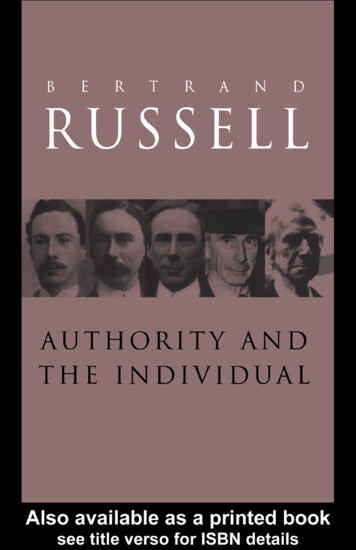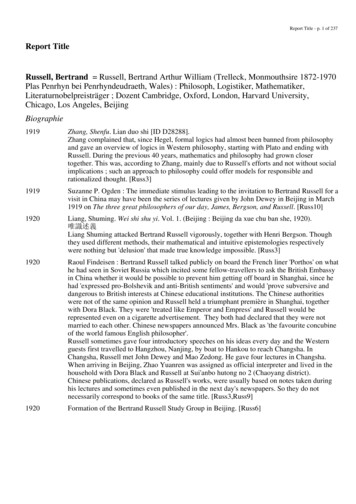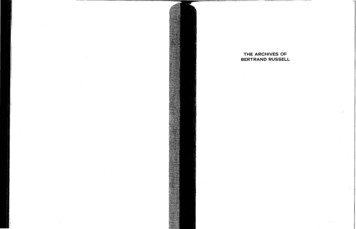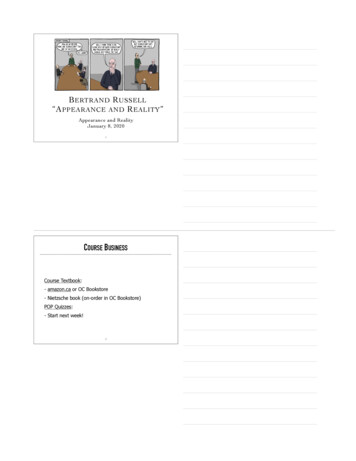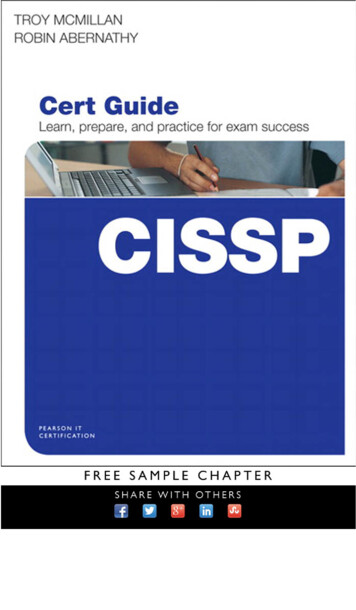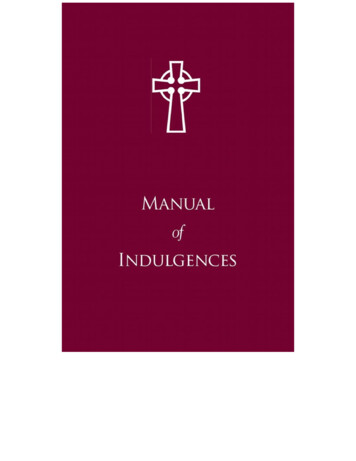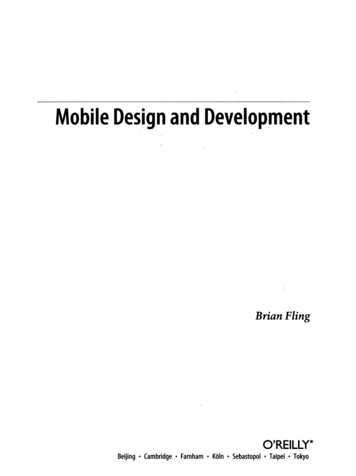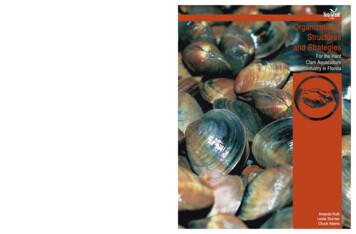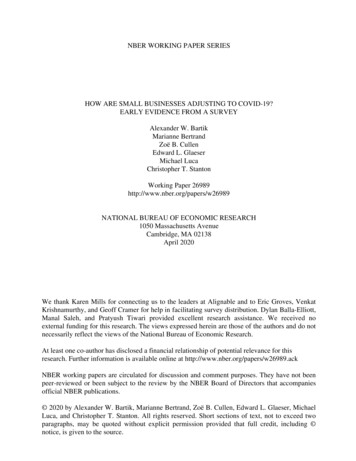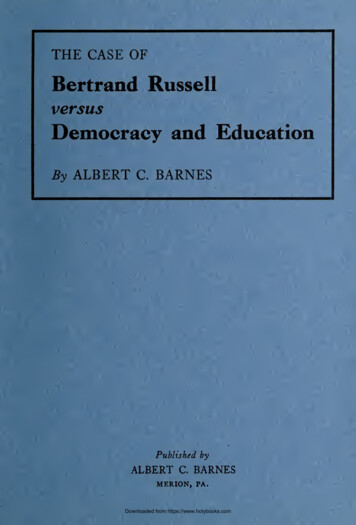
Transcription
THE CASE OFBertrand RussellversusDemocracy and EducationBy ALBERT C. BARNESPublished byALBERT C. BARNESMERION, PA.Downloaded from https://www.holybooks.com
Downloaded from https://www.holybooks.com
THE CASE OFBertrand Russell vs. Democracy and EducationbyALBERT C. BARNESTwo years ago the newspapers of three continents informedtheir readers that Bertrand Russell had been ousted from ahighly paid job and named me as the person responsible.More recently the same papers reported that Mr. Russell hadwon his suit for alleged breach of contract. What they have notreported is that we were never given an opportunity to presentin Court the circumstances which led to Mr. Russell’s dismissal.The purpose of this pamphlet is to put on record publiclythe facts responsible for a serious break in the most vitalstrands in the fabric of American life.My own connection with Mr. Russell’s career began in1940. In February of that year he was appointed Professorof Philosophy at the College of the City of New York, anda bitter public outcry immediately arose that Mr. Russellwas morally unfit to teach, that his appointment was a civicoutrage. On March 30, Justice John E. McGeehan, of theSupreme Court of New York, voided the appointment,chiefly on the ground that Mr. Russell was an open advocateof immorality.Largely through political chicanery, Mr.Russell was denied the right of his day in Court. Convincedthat this constituted a flagrant violation of the Bill of Rights,John Dewey and eight other scholars representing the Com-[1]Downloaded from https://www.holybooks.com
mittee for Cultural Freedom prepared an account of thefacts and the law involved, which appeared in a book entitled“The Bertrand Russell Case.”To this I contributed aForeword; also the cost of publication.In this Foreword I wrote:“The book is simply the record of an inquiry into thefacts of the case—an inquiry conducted by specialistsqualified to examine its manifold aspects and to relatetheir findings to the principles of justice, law, humanity,and common decency, as these are set forth in the Con stitution of the United States and in the Bill of Rights.”This Foreword, as quoted, is equally applicable to the presentcase; and the recital which follows is prompted by the sameconcern for justice and a full airing of the facts that promptedthe book in question when Mr. Russell was the victim.The plight of Mr. Russell, deprived by Justice McGeehan’sdecision of the constitutional right to a fair trial, came at amoment when the Barnes Foundation had decided to sup plement its courses in the appreciation of art by a systematiccourse in the historical and cultural conditions under whichthe traditions of art developed. Mr. Russell’s early trainingin philosophy, his knowledge of the history of ideas, and hisgifts of exposition seemed adequate qualification for theposition to be filled. Though I knew of Mr. Russell’s pro pensity for getting himself embroiled with established lawand order, and was aware that after brief engagements atHarvard, Chicago, and the University of California he hadbeen permanently retained nowhere, I decided to take therisk of recommending him for the position at the BarnesFoundation.My friend, Professor Dewey, wrote to Mr.Russell to inquire whether he would be interested and, uponhis receiving a favorable reply, I went to California to discussthe matter with Mr. Russell himself.I explained fully to Mr. Russell that for more than twentyyears we had been conducting a plan of adult education,[2]Downloaded from https://www.holybooks.com
putting into practice, by means of scientific method, theconceptions propounded in Dewey’s classic volume, “Democ racy and Education”; I told him that we employed thesame method, not of authority handed down from abovebut of free discussion, in which staff and students participatedby pooling their knowledge and endeavoring to achieve agenuinely shared experience. I told him that at a weeklystaff meeting the teachers discussed problems presented bytheir students; that applicants for classes had to be approvedby the Board of Trustees, and that those selected wererequired to attend classes regularly and were expelled iftheir behavior interfered with the rights of any other student.Having thus put before Mr. Russell the program of theFoundation and the functions of its teachers, I asked if heapproved and if he wished to become a member of the staff.He replied emphatically that he did approve and that itwould be “a pleasure, a privilege and an honor” to be identi fied with the program.The plan outlined to coordinateMr. Russell’s course with those already in operation at theFoundation would take five years to complete, includingpreparation of a book embodying Mr. Russell’s lectures. Heasked for a contract to cover the entire five-year period andwe agreed upon six thousand dollars as yearly salary. Fourdays after a contract embodying these terms was executed,Mr. Russell wrote me: “You have made the most enormousdifference to my peace of mind and power of work—morethan I can possibly express.”About a month later, Mr. Russell called at my office andtold me that he would be compelled to abandon popularlecturing if he were to do his work for us properly, but thatthe sacrifice of income involved would present him with aserious financial problem. When I asked him exactly whatthe amount of the sacrifice would be, he told me that itwould be two thousand dollars a year, and added that hewas sick and tired of popular lecturing and wished to devoteall his energies to serious work. Upon my further inquiry[3]Downloaded from https://www.holybooks.com
whether he meant that if I could arrange for an increase inhis salary from six to eight thousand dollars he would agreeto discontinue all popular lectures and give the time thussaved to work for the Foundation, he eagerly assented,reserving only the right to deliver, “a very occasional lectureto some university audience.” On this basis, his salary wasincreased to 8,000.00 per year. Four weeks later he wroteme, “I look forward to a quiet life without popular lecturing,which I hate.”In my conversation with Mr. Russell in California, I hadparticularly emphasized the fact that our educational pro gram ‘was a joint enterprise, involving participation by allthe members of our staff as well as our students. Accordingly,I arranged for a meeting of Mr. Russell and our other teachersat the earliest possible moment after he assumed his duties.The result of this meeting was completely barren: Mr. Rus sell showed not the slightest interest in what the otherteachers were doing, or desire to acquaint them with hisplans for his own course, or the purposes he intended tocarry out in it. He evidently had no conception of what wasimplied in a cooperative undertaking and no desire to findout. This was our first intimation of the shape of thingsto come.During the first five months of his stay at the Foundation,Mr. Russell lectured for the most part extemporaneously,with reference to his manuscript chiefly for topics or toquote verbatim.He was fluent, vivacious and witty, andthe students were attentive and interested; on the otherhand, he never attempted to relate the content of his lecturesto the students’ interest in art, and certainly not in theslightest degree to what they learned in our other courses.He lectured only once every week, from October 1 to May 31each year. He was in the habit of entering the building justin time for the start of his one-hour lecture at quarter aftertwo, devoting never more than fifteen minutes to answeringquestions after the class, and then leaving the building[4]Downloaded from https://www.holybooks.com
immediately.Never did he mingle with the students oninformal terms or encourage those who were shy to ask himquestions in individual conversation, or seek to discoverangles of approach that they might find interesting or enlight ening.In one of his lectures, when a question of morals was raised,Mr. Russell roundly asserted that issues involving ultimatemoral or social values could not be settled by the use ofscientific method, but only by a “bash on the head” — byviolence or terror. Nothing better illustrates Mr. Russell’ssubstitute for scientific method than his procedure whenevera question relating to religion or morals came up for dis cussion. When, for example, he discussed the Jewish rituals,it was in a tone of ridicule and derision; and on one occasionhe related with great gusto a story about an anonymousbook, the thesis of which was that “the three greatestimpostors in history were Moses, the Virgin Mary, andJesus Christ.” Mr. Russell added, gleefully, that since theauthor of the book is not known, “I would now like to putin my claim for its authorship.”In one of his books, Mr. Russell refers to a type of con descension “which delicately impresses inferiors with a senseof their own crudity.” It was this manner of condescensionwhich served as Mr. Russell’s “bash on the head” to intimi date and reduce to silence anyone who might be disposed tosubmit his opinions to discussion, By it he established areign of terror which isolated him from his students aseffectively as he had already isolated himself from his col leagues.Almost immediately upon Mr. Russell’s arrival in Phila delphia, and before he assumed his duties at the Foundation,it became apparent that there was a disturbing factor inthe situation of which we had had no previous inkling.This factor was Mr. Russell’s wife. At the outset she madeit known to us that she is “Lady Russell.” Her demeanorcontained more than a suggestion of imperiousness, and her[5]Downloaded from https://www.holybooks.com
manner with the members of the staff made it apparent thatshe expected to exercise distinctly unusual prerogatives. Shearrogated to herself the right to attend classes without com plying with the usual formalities, and at whatever timesuited her own convenience. On one occasion she burst intothe building and created a scene by a loud and imperiouscommand to one of the members of the Board of Trustees.This tantrum was one of a series of disturbing events whichbegan soon after Mr. Russell’s course started and recurredfrequently.A rising tide of complaint from members of the classtestified that the normal management of the Foundation’saffairs was being disrupted by her disorderly conduct—toput it mildly. A written report given to Mr. Russell calledhis attention to recorded details of this impossible situationand its lamentable incongruity with an educational programdesigned to embody equal rights for all. His reply was thathe had not shown the complaint to his wife and that hehoped the matter would go no further—a reply which gavethe impression that fear of his wife’s reaction to the complaintdeterred him from informing her about it, and that no reme dial action could be expected from him.Several months later, Mrs. Russell’s continued defiance oflaw and order necessitated official action by the Board ofTrustees.She was informed that—‘‘The Foundation hasnever been a place where people may drop in occasionally,at their own volition, nor is any person whosoever allowedto do things that interfere with the rights of others or areharmful to the Foundation’s interests.”Her reply to this was a tirade composed of arrogance, rageand self-pity.Mr. Russell’s contribution to the incidentwas a curt and incisive note in support of his wife. Thecorrespondence closed with a reminder to Mr. Russell that“when we engaged you to teach, we did not obligate our selves to endure forever the trouble-making propensities ofyour wife.” The question thus forced upon us was to settle[6]Downloaded from https://www.holybooks.com
whether autocracy or democracy was to prevail in the con duct of the Foundation’s affairs. It was settled by a formalnotice to Mrs. Russell to stay away from the Foundation.With this dismissal of his wife, a steady deterioration inthe quality of Mr. Russell’s lectures set in. His manner inthe classroom lost its animation and grew perfunctory, evenapathetic. More and more he merely read from his manu script, and more and more what he read consisted of matteraccessible to all in standard works of reference. Often hespoke so fast that a skilled stenographer could not takeaccurate notes of what he said. During the discussion periodafter the class he was increasingly disposed to answer ques tions with a chuckle, a wisecrack, or a reply which subjectedthe questioner to ridicule.The result showed quickly in the attendance figures, andbecame constantly more unmistakable.Absences multi plied; more and more members withdrew entirely from theclass; it was the better students who went, the poorer whostayed. By December of 1942, of the sixty selected studentsoriginally admitted, only eleven were left.Shortly after the beginning of the second year of his course,a fresh development came to light which compelled us toreview the whole situation of which Mr. Russell was a part.It will be remembered that a few weeks after Mr. Russellwas engaged and the amount of his salary fixed, his annualsalary was increased by two thousand dollars, in considera tion of which he was to discontinue popular lecturing afterApril 1, 1941, when a contract for popular lectures expired.Now we learned that at a time subsequent to that dateMr. Russell had gone back to popular lecturing; not to giving,in the terms he had used in his letter to me, “a very occa sional lecture to some university audience,” but to wide spread popular lecturing even though, after his salary hadbeen increased, he had written me, “I look forward to aquiet life, without popular lecturing, which I hate.”With this gross breach of contract in mind, we began to[7]Downloaded from https://www.holybooks.com
consider the question of his dismissal from the staff, butdelayed action for several months while we submitted theentire evidence to a group of distinguished authorities inethics and law. The legal experts’ opinion was that he hadbroken his contract by popular lecturing and by his uphold ing of Mrs. Russell’s disorderly conduct. The ethical supportof the legal opinion was based upon Mr. Russell’s performanceas a member of the Foundation’s teaching staff; that is, henever made any efforts to bring what he was doing intofruitful relationship with the work of his colleagues; hislectures appeared to be a task for him and had been a drearyordeal for those who had abandoned the class; he had madenot a single contribution to the solution of problems con fronting the rest of the teaching staff or to the organizationas a whole. Never, in short, did Mr. Russell in any manneror degree identify himself with the Foundation’s programof democracy in education. His appearance for one hour andfifteen minutes, once a week, for which he received twohundred and fifty dollars each time, amounted to punchinga time clock in order to obtain an inordinately large paycheck.Finally, in December, 1942, we decided that thefarce could go on no longer and he was dismissed. *The foregoing recital sets forth the circumstances underwhich Bertrand Russell joined the staff of the Barnes Founda tion, the conditions to which he agreed at the outset, andthe failure on his part to live up to those conditions whichresulted in his dismissal. A brief summary now of the aimsand methods of the Foundation’s educational program willreveal the conflict between Mr. Russell’s autocratic andauthoritarian attitude toward life and the democraticand scientific attitude on which the Foundation’s programhas always been based.[8]Downloaded from https://www.holybooks.com
The account of this program which follows consists of asimplified statement of the fundamentals of the philosophyof John Dewey as applied to education. This system restson the axiom that the indispensable elements of the demo cratic way of life — scientific method as intelligence in opera tion, art, education—are all bound together in a singleorganic whole. To put the matter in other terms, all genuineexperience is intelligent experience, experience guided byinsight derived from science, illuminated by art, and made acommon possession through education. This conception hasimplications of the most far-reaching import.When thecommon experience which ought to be the birthright of allhuman beings is broken by barriers of ignorance, classprejudice, or economic status, the individual thus isolatedloses his status as a civilized human being, and the restorationof his wholeness is possible only by reestablishment of thebroken linkage.Applied to the field of education, this conception impliesthat the prevailing academic methods of instruction in artare misdirected from the very beginning. What the studentneeds to know is not how men of genius produced immortalmasterpieces long ago, but how in the world that his owneyes show him he can discover more and more of what lendscolor and zest to what he does from day to day. The master pieces have their indispensable function, but it is the functionof guiding and training the student’s own perception, notof standing in remote isolation as objects of worship oroccasions for gush.The misconception which identifies art with what is remote,high-flown or artificial is paralleled by another which con fines science to the laboratory or lecture-hall. II the chemistis thought of as operating exclusively with balances andtest-tubes, the astronomer as helpless without a telescope, orthe historian as a reader of volumes or manuscripts in alibrary, the essential factor of scientific procedure is lostsight of. Science is science not because laboratory apparatus[9]Downloaded from https://www.holybooks.com
or words of a technical vocabulary are employed, but becauseobservation and reflection are joined and correlated bymethods that have proved themselves to be illuminating andfruitful.The problems with which science is concernedoriginate outside the laboratory—in the fields which mustbe tilled, the swamps that must be drained, the epidemicsthat must be controlled, the refractory human beings whoseacts and purposes must be harmonized for the sake of a goodsocial order. As the problems crystallize, possible solutionstake form in the realm of hypothesis, and it is in the labora tory that these receive their first experimental test; but thetesting is never complete until the course of reflection hasflowed out into the world again, and human activities therehave been given a wider scope and a richer meaning.Education is growth, the development of the faculties withwhich every normal child is born. Growth is gradual, fosteredonly by means of communication between the individualand his world. Education provides an orderly progressionof the means by which the avenues of communication aregradually widened in scope. It is a never-ending processthat extends from the cradle to the grave. “Gradual” meansa succession of steps or stages. If the learner attempts tovault over the stages through which natural growth inevitablyproceeds, the result is pretense or self-deception, sham erudi tion masquerading as “culture.” It is a view only too widelyprevalent that what is “common” is commonplace, andhence contemptible; that distinction consists in avoidingand despising the common; and this is the view that inevitablyleads in practice to the gentility which is only another namefor vulgarity. In contrast, any work which proceeds fromreal living has its own integrity and dignity and whether itsucceeds or fails never sinks into the meretricious or tawdry.The interconnection of science and art becomes more fullyapparent when we consider them both as means of com munication, as indispensables in all educational move ments.Born, as we all are, helpless and speechless and[io]Downloaded from https://www.holybooks.com
dependent upon others for all the necessities of life, wemust acquire slowly and gradually the capacities whichmake life more than a sum of vegetative and animal processes.As the utterly self-centered and uncomprehending infantdevelops, the chaos which is his world begins to take onorder and to mirror the objective world which lies abouthim. He learns to relate his cries, wails and random move ments to what the things, and especially the persons, in hisenvironment do to him. At some point in his growth hegrasps the difference between things, which simply affecthim, and persons who communicate with him. Throughoutthe rest of his life he elaborates the distinction. He learnsthat he must not treat persons as things: this is the dawnof morality.He learns that a more penetrating, a morecomprehensive grasp of things enables him to do with themwhat he could never do by his untutored impulses: this isthe dawn of science. He learns, for example, that with par ticular tones of his voice, gestures, combinations of words,he can make others aware of what he sees with his mind’seye: this is the dawn of art.Morality, science, art, all alike, are forms of communica tion, possible only through the sharing of experience whichconstitutes civilized living. In its widest sense, educationincludes all of them; but only if education is conceived, notin the conventional sense, as preparation for life, but asliving itself. To have conceived education thus, and to havedeveloped the conception until it covers the whole field ofhuman experience, has been the supreme achievement ofJohn Dewey—an achievement rarely paralleled in scope inthe entire history of education. viyv’ym M MlThe foregoing consideration makes it possible to statebriefly the case against Bertrand Russell. If education is[ii]Downloaded from https://www.holybooks.com
designed to enrich the experience of the student by makinghim an active participant in the widest and deepest experi ences which art, science, and civilization have developed,then Bertrand Russell contributed little or nothing to theeducation of his class. The reason for his failure was thathe himself had no conception of democracy as a sharing insignificant experience. The history of ideas about which helectured was a history of abstractions torn from their humancontext, with not the slightest recognition of the concretefulness of experience throughout all its history.In thereligious and moral history of the past Mr. Russell could seemainly an occasion for derision and contempt. Above all,he felt so little share in the desire of his students to relatethe things he was talking about to their own experience, thatthe fear of his ridicule froze on their lips the questions thatthey would have liked to ask.If they learned anythingwhatever of democracy in education from him, it was becausehe presented them with the perfect example of its antithesis.Published byAlbert C. BarnesMerion, Pa.Downloaded from https://www.holybooks.com
Downloaded from https://www.holybooks.com
Downloaded from https://www.holybooks.com
Bertrand Russell vs. Democracy and Education . by . ALBERT C. BARNES . Two years ago the newspapers of three continents informed their readers that Bertrand Russell had been ousted from a highly paid job and named me as the person responsible. More recently the same papers reported that Mr. Russell
